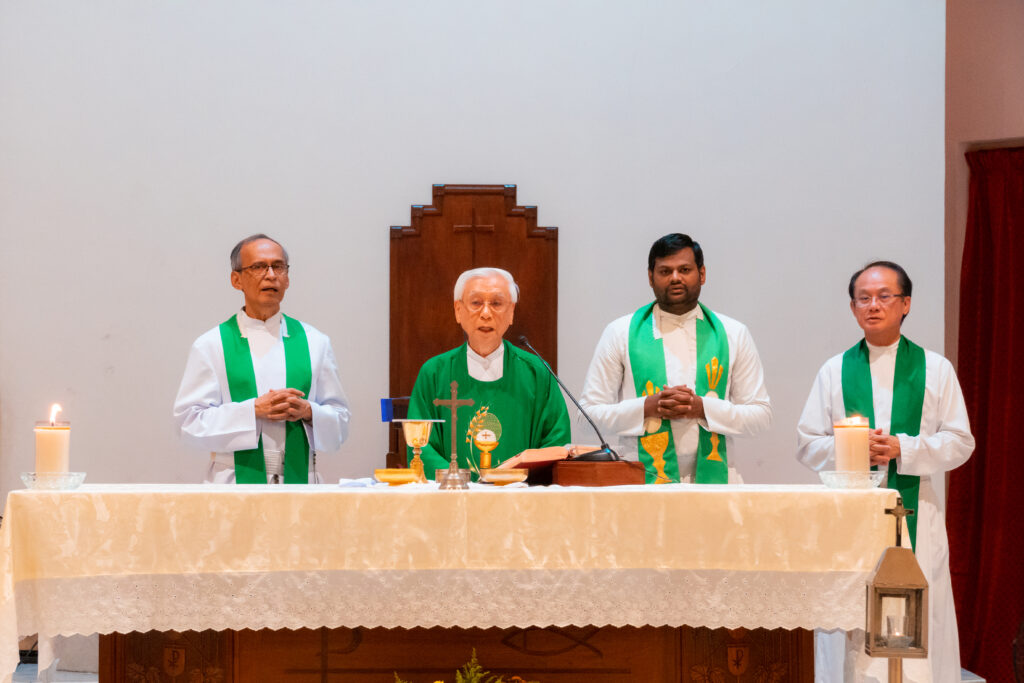SCIC Triduum Day 3: Heralds of Unending Grace

The third day of triduum in honour of Sts Chastan and Imbert continued with Mass celebrated by our Mission Fathers. “The reflection on the Korean martyrs calls us to walk with missionary zeal for Christian love. Amidst difficult times, we can renounce everything but our call towards Christian love, our call to be a herald of unending grace,” emphasised Rev Fr John Paul, the preacher of the day.
One of the things about the Korean martyrs that brings a sense of edification (deepening of faith) is that they withstood wave after wave of persecution. Within a short span of time, Korea had thousands of unsung martyrs, and upon these martyrs is the Korean Church founded. Even our faith is founded on the seed that is the blood of the martyrs and strongly held by tradition, which is 2,000 years old. From the fullness of Christ handed down by tradition, we have received the grace of faith; grace upon grace.
Fr John Paul invited the congregation to reflect upon the phrase “grace upon grace”, found in John 1:16. It means grace that is ever flowing, never ending, and ever increasing. We are called to be heralds of this grace, to be signs and symbols of blessing after blessing.
We have received our faith as a pure gift, and we can never take full credit for our faith for ourselves; our faith is from the grace of God that is acting in us. We are called to transmit this faith through our love. If we don’t do this, we are not heralds of grace. As we receive it freely, we are called to give it freely to others.



Wasteland, rocky ground, thorny ground or fertile soil?
The Parable of the Sower can be used to reflect on the gift of faith in our lives. The seed of faith can be compared to the seed that is sown in different types of soil. Sometimes, it falls in wasteland. There are situations in our lives when we replace God with something else. We put our faith in something other than God, and the birds of the air come and take it away.
Sometimes, the seed falls on rocky ground. On this ground, the seed does not take root. When the sun scorches, the shoot withers away. Our faith sometimes doesn’t take root when we lack personal convictions. “Why am I a Christian?”, “Why do I say the Rosary?” and “Why do I come to church?” If these essential and vital questions are asked, sometimes our answers are that we come to church because of our ancestors or someone else. Yes, indeed we received our faith from our ancestors, faith formattors, the community, and others, but it is not enough. We need to root our faith in a personal relationship with God.
At other times, our faith is like the seed that falls among thorns and is choked. This is during the times when we are faced with struggles and difficulties and we question, “Why me, God?” Our faith is choked and we look for answers and clarifications. Finally, there is the seed that is sown in good soil. This seed is fruitful and produces multiple times what was sown. Nevertheless, let us not be judgmental about each other’s faith. We can all experience these four situations at various times in our lives.
Good fruit or sour grapes?
God also calls us to reflect on the grace of faith from a different angle. God called the people of Israel to have faith so that they might bear fruit in their life. He says, “O Israel, when I brought you out of Egypt, you were like a vine plant. I planted you in the promised land, and I expected you to bear fruit. But you disappointed me by bearing sour grapes.” (Isaiah 5:1–2) But God did not abandon Israel. He was always faithful, sending prophets after prophets, calling them towards conversion.
Sometimes, we may appear to bear fruit in our lives, but it could be sour grapes. It could be due to us cheating ourselves about our faith life and being insincere about our sins. We may have a pharisaical attitude of self-righteousness. We may seem to bear fruits, but not the fruits that are expected by God. Faith has been given to us as a pure grace, but it is for us to water and nourish it to bear good fruit. The responsibility lies within us.
How do we become heralds of unending grace? We are called to be something more than our daily activities. If I am satisfied with my daily routine, I am not living my life as a herald of grace. We all have responsibilities at work, within our families, and for the future that we need to fulfil, but beyond that are we also living our vocation to spread the love of God in the world? I cannot be content with the minimum that I do; I must be a herald of unending grace. Everyone can be a herald of grace in one’s own way; the call to holiness is universal. So, what is something more that I can do with my life to be an instrument of grace in the world today?

